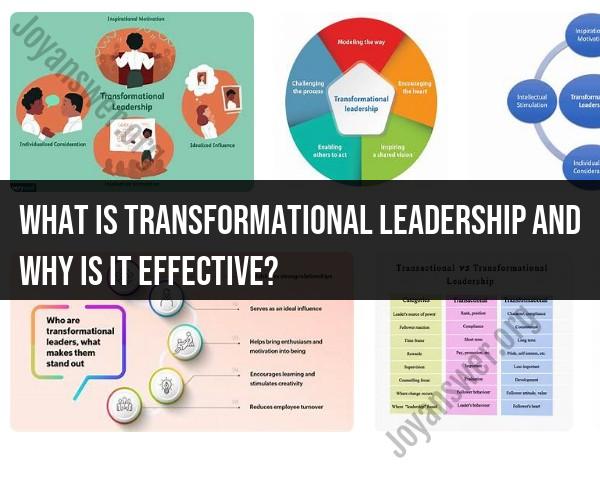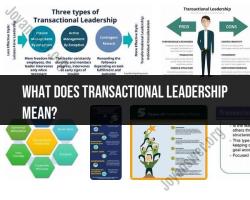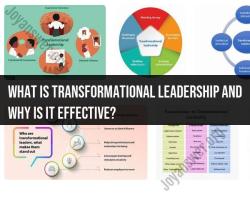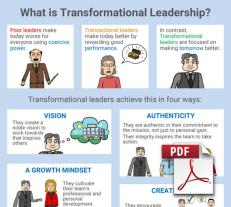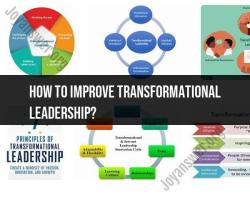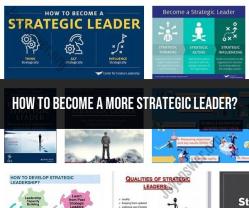What is transformational leadership and why is it effective?
Transformational leadership is a leadership style that focuses on inspiring and motivating followers to achieve extraordinary outcomes and exceed their own expectations. This leadership approach goes beyond simply managing day-to-day tasks; it aims to create a positive and impactful change in both individuals and the organization as a whole. Transformational leaders are known for their ability to influence, inspire, and elevate the performance of their teams. Here are key elements and reasons why transformational leadership is considered effective:
Charismatic Leadership:
- Transformational leaders often possess charismatic qualities that attract and inspire followers. They have a compelling vision, strong communication skills, and the ability to articulate a clear and exciting picture of the future.
Inspiration and Motivation:
- Transformational leaders inspire and motivate their teams by fostering a shared vision. They instill a sense of purpose and excitement, helping individuals connect their work to a larger, meaningful goal.
Intellectual Stimulation:
- This leadership style encourages creativity and innovation by challenging followers to question assumptions, think critically, and explore new ideas. Transformational leaders promote a culture of continuous learning and improvement.
Individualized Consideration:
- Transformational leaders demonstrate genuine concern for the individual needs and development of their team members. They provide personalized support, mentorship, and coaching, acknowledging the unique strengths and aspirations of each follower.
Empowerment and Trust:
- Transformational leaders empower their teams by delegating responsibilities and trusting them to make decisions. This empowerment builds confidence and a sense of ownership among team members.
High Emotional Intelligence:
- Effective transformational leaders typically exhibit high emotional intelligence. They understand and manage their own emotions well and are adept at recognizing and responding to the emotions of others. This contributes to positive interpersonal relationships.
Adaptability and Visionary Thinking:
- Transformational leaders are adaptable and possess visionary thinking. They anticipate changes in the business environment, articulate a compelling vision for the future, and guide their teams through periods of change and uncertainty.
Enhanced Team Performance:
- Teams led by transformational leaders often demonstrate higher levels of performance, engagement, and job satisfaction. The positive and supportive leadership style fosters a collaborative and cohesive team culture.
Long-Term Organizational Success:
- Transformational leaders focus on long-term goals and sustainability. By inspiring a shared vision and fostering innovation, they contribute to the overall success and growth of the organization.
Positive Organizational Culture:
- Transformational leadership contributes to the development of a positive organizational culture. The emphasis on shared values, teamwork, and individual growth helps create a workplace that people are proud to be a part of.
Resilience in Times of Challenge:
- Transformational leaders help build resilience within their teams. By promoting a positive outlook, providing support during challenges, and maintaining optimism, they help teams navigate adversity effectively.
In summary, transformational leadership is effective because it goes beyond traditional management styles. It taps into the intrinsic motivation of individuals, fosters a sense of purpose, and creates a culture of continuous improvement and innovation. The positive impact of transformational leadership extends to both individual development and organizational success.
What defines transformational leadership and its effectiveness?
Defining Transformational Leadership:
Transformational leadership is a style of leadership that focuses on inspiring and motivating followers to achieve extraordinary outcomes. It goes beyond transactional leadership, which focuses on exchanging rewards for performance, by building a shared vision, fostering intrinsic motivation, and empowering followers to reach their full potential.
Key characteristics of transformational leaders include:
- Idealized influence: They serve as role models and inspire others with their vision and integrity.
- Inspirational motivation: They communicate a clear and compelling vision that motivates followers to strive for excellence.
- Intellectual stimulation: They encourage creativity, innovation, and critical thinking among followers.
- Individualized consideration: They provide support and guidance to individual followers, helping them develop their skills and reach their full potential.
Effectiveness of Transformational Leadership:
Numerous studies have demonstrated the effectiveness of transformational leadership in various settings. It has been shown to lead to:
- Improved organizational performance: Transformational leaders create a more engaged and motivated workforce, resulting in higher productivity, innovation, and profitability.
- Increased employee satisfaction and commitment: Transformational leaders create a positive work environment where employees feel valued and empowered, leading to higher job satisfaction, commitment, and retention.
- Enhanced change management: Transformational leaders are effective in leading organizations through change by providing a clear vision, building consensus, and empowering employees to adapt.
- Greater adaptability and resilience: Transformational leaders help organizations better adapt to changing circumstances and overcome challenges by fostering creativity, innovation, and a willingness to learn.
Research has also identified factors that contribute to the effectiveness of transformational leadership:
- Leader-member exchange (LMX): High-quality LMX relationships, characterized by mutual trust and respect, are essential for maximizing the effectiveness of transformational leadership.
- Contextual factors: Organizational culture, resources, and external environment can influence the effectiveness of transformational leadership.
- Leader development: Leaders who continuously develop their skills and knowledge are more likely to be effective transformational leaders.
Overall, transformational leadership has proven to be a highly effective leadership style that can significantly benefit individuals, teams, and organizations. By understanding the key characteristics of transformational leaders and the factors that contribute to their effectiveness, individuals can develop their own leadership skills and organizations can foster a more positive and successful work environment.
Additional Resources:
- The 5 Practices of Transformational Leadership by James M. Kouzes and Barry Z. Posner
- Transformational Leadership: Creating an Inspiring and Motivating Workplace by Susan Cartwright and Robert E. Hay
- Center for Creative Leadership: https://www.ccl.org/
- Ken Blanchard Companies: https://www.blanchard.com/
